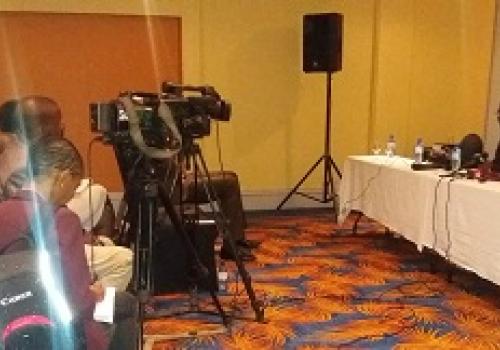On 14 March 2016, SADC Senior Programme Officer for Health and Pharmaceutical (Social Human Development & Special Programs Directorate), Mr. Joseph Mthetwa briefed the Media on the measures taken by SADC to protect the region from the epidemic as well as on the Zika Virus related diseases.
Mr. Mthetwa explained that SADC Secretariat in consultation with the Chairperson of Council will:
- Work with partners to strengthen capacity in risk communication to help Member States meet their commitments under the International Health Regulations (IHR) such as enhancing surveillance of the Zika virus and disorders that could be linked to it, improve vector control, effectively communicate risks, guidance and protection measures
- Facilitate the development of response guidelines on Joint Operations Control measures in accordance to WHO Standards
- Coordinate regional effort through the existing Elimination 8 (E8) Cross Border Initiative for Malaria Elimination.
Replying to the concerns expressed by the Media about how the virus operates in Human beings, available treatments and precautions to take, Mr Mthetwa explained what Zika virus is and how it is transmitted to people: “The virus is transmitted through the bite of an infected mosquito Aedes aegypti mosquito (This is a yellow fever mosquito that can spread the dengue fever, Chikungunya and yellow fever viruses, and Zika Virus Disease)existing in tropical regions. Zika virus disease is usually relatively mild and requires no specific treatment. The symptoms include fever, skin rashes, conjunctivitis, muscle and joint pain, malaise, and headache. These symptoms are usually mild and last for 2 - 7 days.”
“Prevention and control relies on reducing mosquitoes through source reduction (removal and modification of breeding sites) and reducing contact between mosquitoes and people”, he added.
To date, SADC Region is safe. Only one case was recorded in the Region through a Colombian citizen who travelled to South Africa in February 2016. Other than this reported imported case no case of Zika Virus has been reported in the Region.
The alert on Zika was raised in May 2015 by the Pan American Health Organization (PAHO) after an alert regarding the first confirmed Zika virus infection in Brazil and on February 1, 2016, the World Health Organization (WHO) declared Zika virus a Public Health Emergency of International Concern (PHEIC).

